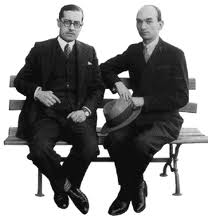Description: Four short pieces of different duration:
1. Chemin du solitaire (Camí del solitari)
2. Chemin de fête sans joie (Camí de festa sens alegria)
3. Chemin de la dernière rencontre (Camí del darrer encontre)
4. Chemin sur la colline (Camí damunt del turó)
Difficulty: About 6/10
Availability: Nowadays at Éditions Salabert.

Sometimes you just need to have a good look: these symbolic, mystical titles in French and Catalan, and a dedication: a l’amic Frederic Mompou. And the musical similarities.
Manuel Blancafort de Rosselló (1897-1987), although he received his first music lessons from his father, and later had harmony lessons with Lamote de Grignon, is actually the unknown younger brother of Frederic Mompou. It was the latter one who urged him to continue composing, during their long periods spent together at the family health resort of Balneario Blancafort at La Garriga, near Barcelona. They became friends for life.
As a young man, Manuel Blancafort worked in the pianola roll factory of his father, and in its service travelled all over the world, later he started a factory for beauty products (“Perfumes Blancaflor”), a cosmetics laboratory, worked for an insurance company, and for the publishing house Ariel. This to sustain an expanding family of eventually eleven children. And in the meantime he composed, lover of silence and seclusion, and was closely involved with musical life in Catalunya…
And you can close your eyes and imagine the landscape going with it just like that – and make yourself ridiculous, when times are changing, or information becomes available. So that’s what we are going to do right away. Times have changed already long ago.
1. Road of the Solitary
Pianissimo, murmuring: it comes in layers, three in this case, sounding wide apart. A monotonously ongoing line which wanders irregularly along the same few notes, a horizon?
A steep, empty pattern underneath it. And over all this a simple, ascending, descending melody which seems unable to make up its mind, ending every time on a slow, single thrill, a bit higher, a bit lower. It stops.
Then a sort of clumsy dance, again and again a few steps made of piled up empty fifths, a little longer, shorter, probably a memory of something cheerful (this indirectness clearly audible). It sounds like a dry, rocky landscape in which every now and then scraps of meaning appear in seemingly accidental, angular leaps, ending in an eruption of… regret?
No, that’s enough. This is not the entire piece, and the other three are just as sunlitsharp and evocative. Their musical means: wide, unfinished sounding chords, or on the contrary tight and wrenching, as if each sound is imagined anew, and tasted. Searching, hesitating melodies, stubborn rhythms, stagnation, sudden movement, harsh contrasts, and always, as if by accident, the appearance of different layers, counterpoint. And nevertheless it all sounds softly, melancholically.
This music wants to reinvent itself from the bottom up, to look for the unhampered expression of its dream-clear wordless images. It is not sociable music, it is meant for every single one of us, for the dreamer in the silent, locked-away world of our lonely hours.
Play it!

